Revisiting May 2002 — 'Voters say no to Amity'
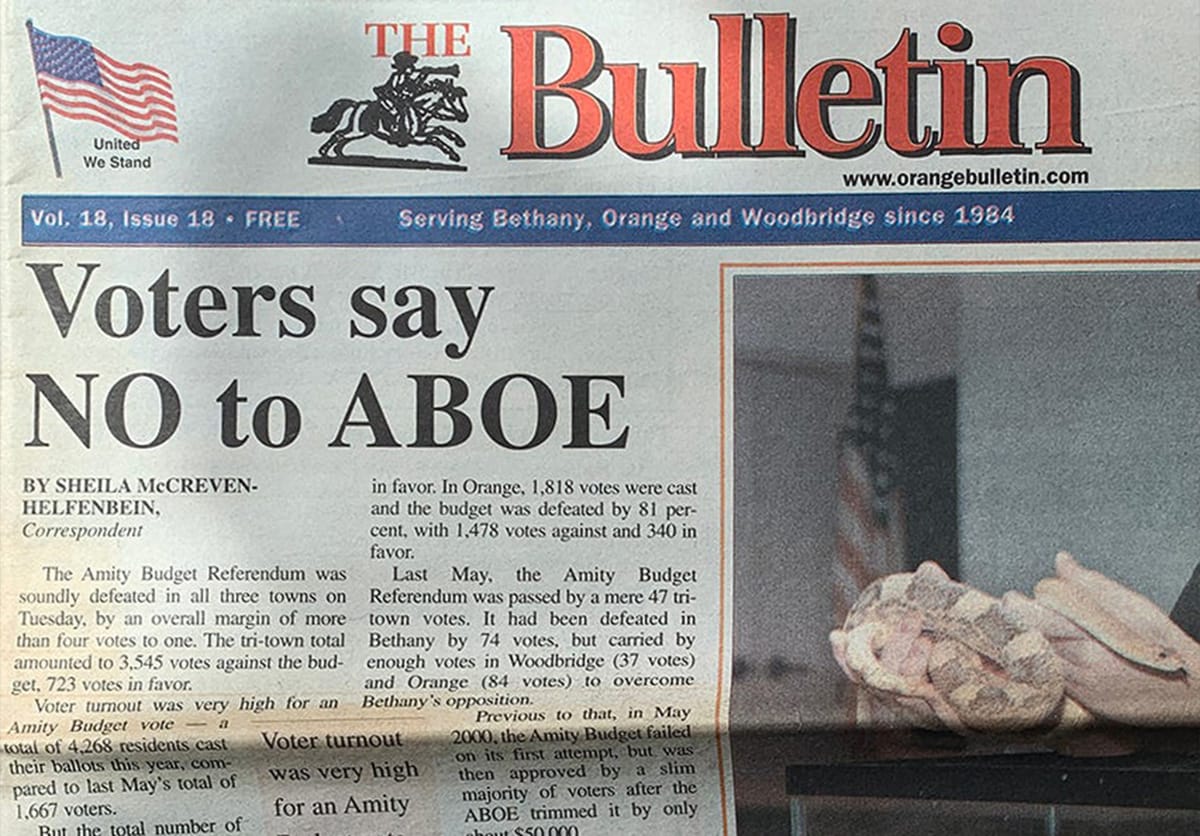
As the month of May unfolds in 2002, a series of misadventures (in the form of failed referenda) befall the embattled Amity Board of Education as it seeks voter approval for its proposed 2002-03 operating budget.
Voters say NO to ABOE
By Sheila McCreven-Helfenbein, Correspondent
Published in the May 9, 2002 edition of The Bulletin
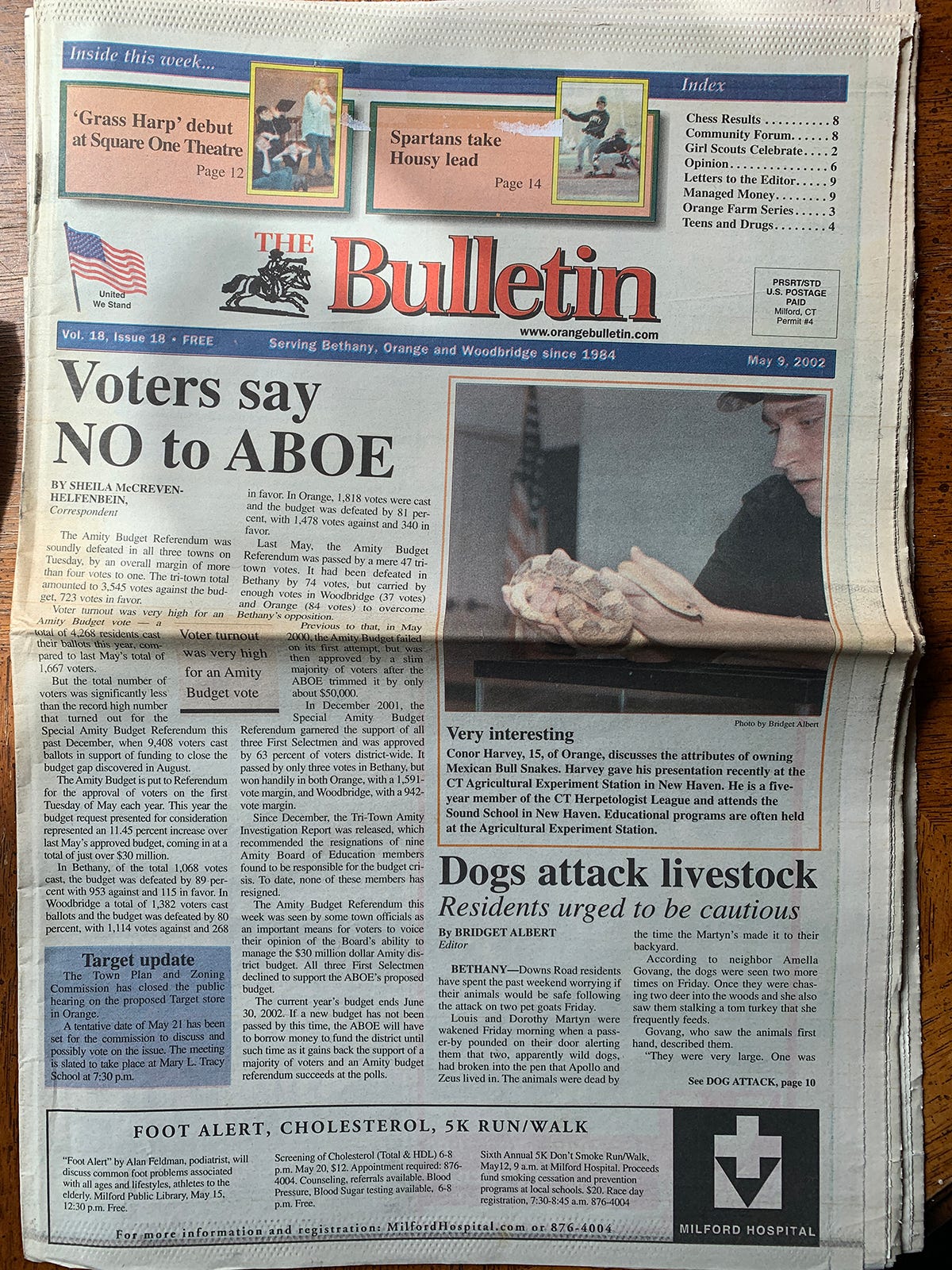
The Amity Budget Referendum was soundly defeated in all three towns on Tuesday, by an overall margin of more than four votes to one. The tri-town total amounted to 3,545 votes against the budget, 723 votes in favor.
Voter turnout was very high for an Amity Budget vote -- a total of 4,268 residents cast their ballots this year, compared to last May's total of 1,667 voters.
But the total number of voters was significantly less than the record high number that turned out for the Special Amity Budget Referendum this past December, when 9,408 voters cast ballots in support of funding to close the budget gap discovered in August.
The Amity Budget is put to Referendum for the approval of voters on the first Tuesday of May each year. This year the budget request presented for consideration represented an 11.45 percent increase over last May's approved budget, coming in at a total of just over $30 million.
In Bethany, of the total 1,068 votes cast, the budget was defeated by 89 percent with 953 against and 115 in favor. In Woodbridge a total of 1,382 voters cast ballots and the budget was defeated by 80 percent, with 1,114 votes against and 268 in favor. In Orange, 1,818 votes were cast and the budget was defeated by 81 percent, with 1,478 votes against and 340 in favor.
Last May, the Amity Budget Referendum was passed by a mere 47 tri-town votes. It had been defeated in Bethany by 74 votes, but carried by enough votes in Woodbridge (37 votes) and Orange (84 votes) to overcome Bethany's opposition.
Previous to that, in May 2000, the Amity Budget failed on its first attempt, but was then approved by a slim majority of voters after the ABOE trimmed it by only about $50,000.
In December 2001, the Special Amity Budget Referendum garnered the support of all three First Selectmen and was approved by 63 percent of voters district-wide. It passed by only 3 votes in Bethany, but won handily in both Orange, with a 1,591-vote margin, and Woodbridge, with a 942-vote margin.
Since December, the Tri-Town Amity Investigation Report was released, which recommended the resignations of nine Amity Board of Education members found to be responsible for the budget crisis. To date, none of these members has resigned.
The Amity Budget Referendum this week was seen by some town officials as an important means for voters to voice their opinion of the Board's ability to manage the $30 million dollar Amity district budget. All three First Selectmen declined to support the ABOE's proposed budget.
The current year's budget ends June 30, 2002. If a new budget has not been passed by this time, the ABOE will have to borrow money to fund the district until such time as it gains back the support of a majority of voters and an Amity budget referendum succeeds at the polls.
Amity budget shows surplus
After receiving an extra $2.25 million in December, ABOE documents now reveal $738,753 will be leftover
By Sheila McCreven-Helfenbein, Correspondent
Published in the May 16, 2002 edition of The Bulletin
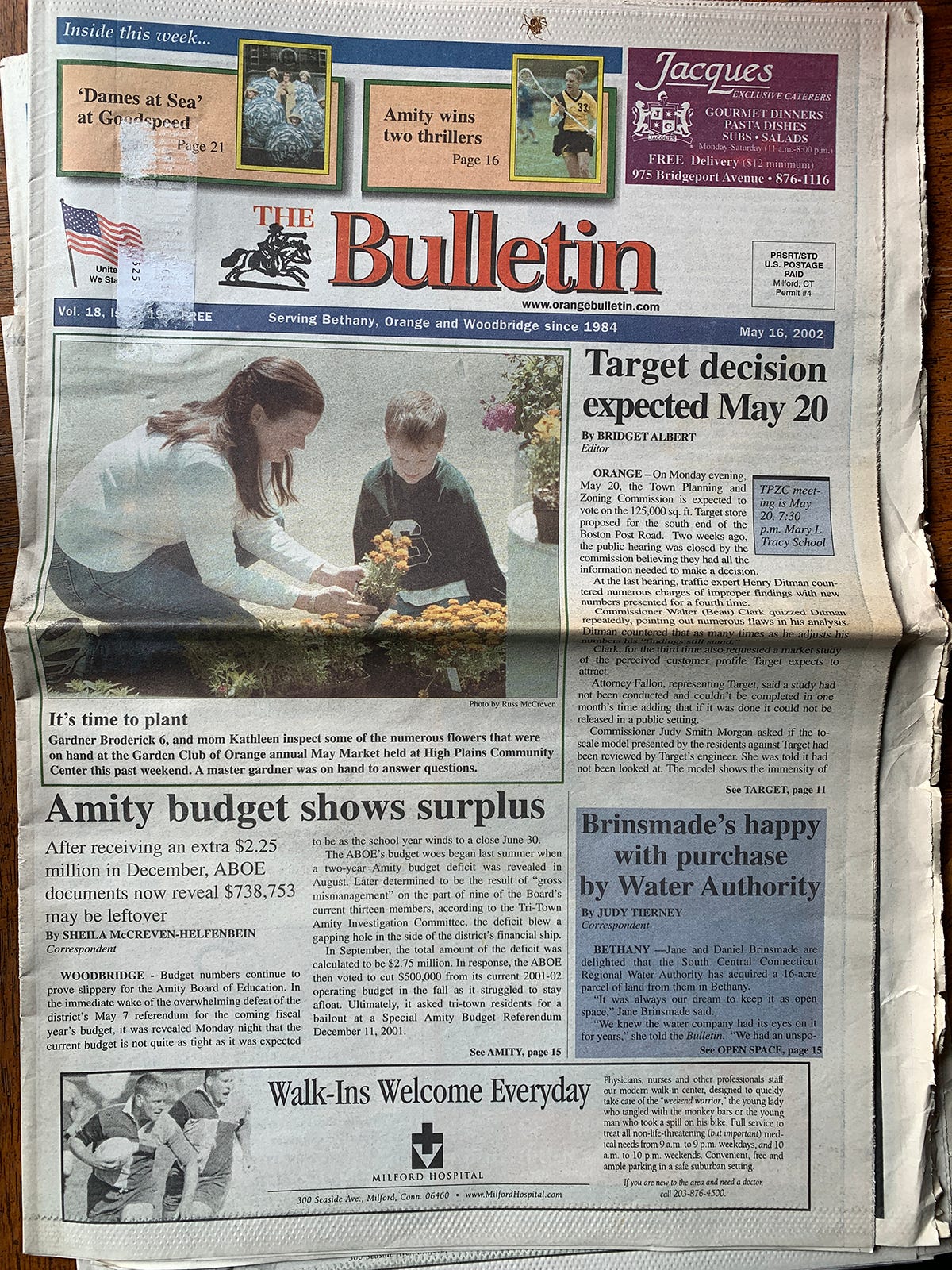
Budget numbers continue to prove slippery for the Amity Board of Education. In the immediate wake of the overwhelming defeat of the district's May 7 referendum for the coming fiscal year's budget, it was revealed Monday night that the current budget is not quite as tight as it was expected to be as the school year winds to a close June 30.
The ABOE's budget woes began last summer when a two-year Amity budget deficit was revealed in August. Later determined to be the result of "gross mismanagement" on the part of nine of the Board's current thirteen members, according to the Tri-Town Amity Investigation Committee, the deficit blew a gapping hole in the side of the district's financial ship.
In September, the total amount of the deficit was calculated to be $2.75 million. In response, the ABOE then voted to cut $500,000 from its current 2001-02 operating budget in the fall as it struggled to stay afloat. Ultimately, it asked tri-town residents for a bailout at a Special Amity Budget Referendum December 11, 2001.
By a margin of two to one, a record number of voters turned out to approve the emergency funding request that infused an additional $2.25 million into the Amity school system, of which $1,127,876 flowed into the current operating budget.
Now, five months later, the Board's Budget Committee has received a document from the district's finance department that shows a significant surplus in the making for the fiscal year ending June 30, 2002 -- and that more than 65 percent of the supplementary funding approved by voters in December for the current budget may go unspent.
After accounting for all expected expenditures between now and then, including all encumbered items such as salaries, the "2001-02 Budget Update" document, dated May 13, 2002, projects an estimated $738,753 will remain untouched in ABOE coffers at fiscal year-end.
Spending priorities exposed
Representing 2.46 percent of the total budget, the new-found surplus is made up of under-spent line items, including such hot-button categories as "Repairs, Maintenance and Cleaning" which is projected to fall short of its spending target by $108,379 (or 9.21 percent of the total line item dedicated to this expense).
Another line item labeled "Communications" is expected to come in $42,313 under budget (or 21.15 percent below what the Board planned to spend), and "Other Professional and Technical Services" is shown as falling short of its spending goal by $90,033 (or 7.02 percent of what was earmarked for this expense).
Also showing a surplus is the "Contingency" line-item, projected to be under-spent by as much as $148,619 by June 30, barring any unexpected need that might arise between now and later next month.
Other line items that directly impact teaching and learning which show significant deviance from planned expenditures include such basics as "Textbooks" (projected to be under-spent by $17,136 or 11.49 percent), "Instructional Program Improvement" (under budget by 40.71 percent, or $1,500) and "Instructional Supplies" (coming in under budget by 13.06 percent, to leave $16,828 unexpended at year end).
How does this new information jive with claims from parents who advocated for support of next year's budget proposal by reporting that students had to bring their own toilet paper to schools struggling with the consequences of under funding? The newly released budget document sheds some light on this topic as well; indeed, the "Maintenance/Custodial Supplies" line item has been under-spent by 48.47 percent through the end of the school year. The $52,895 the ABOE projects it will save here would surly have bought a lot of Charmin.
~~~~~~~~
Pullquote and table that appeared on page 15:
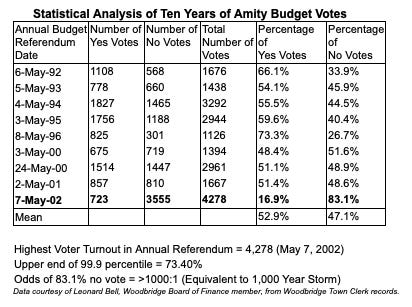
All eyes turn to Amity
While town budgets await a voter-approved Amity line item, the ABOE comes under scrutiny
By Sheila McCreven-Helfenbein, Correspondent
Published in the May 23, 2002 edition of The Bulletin
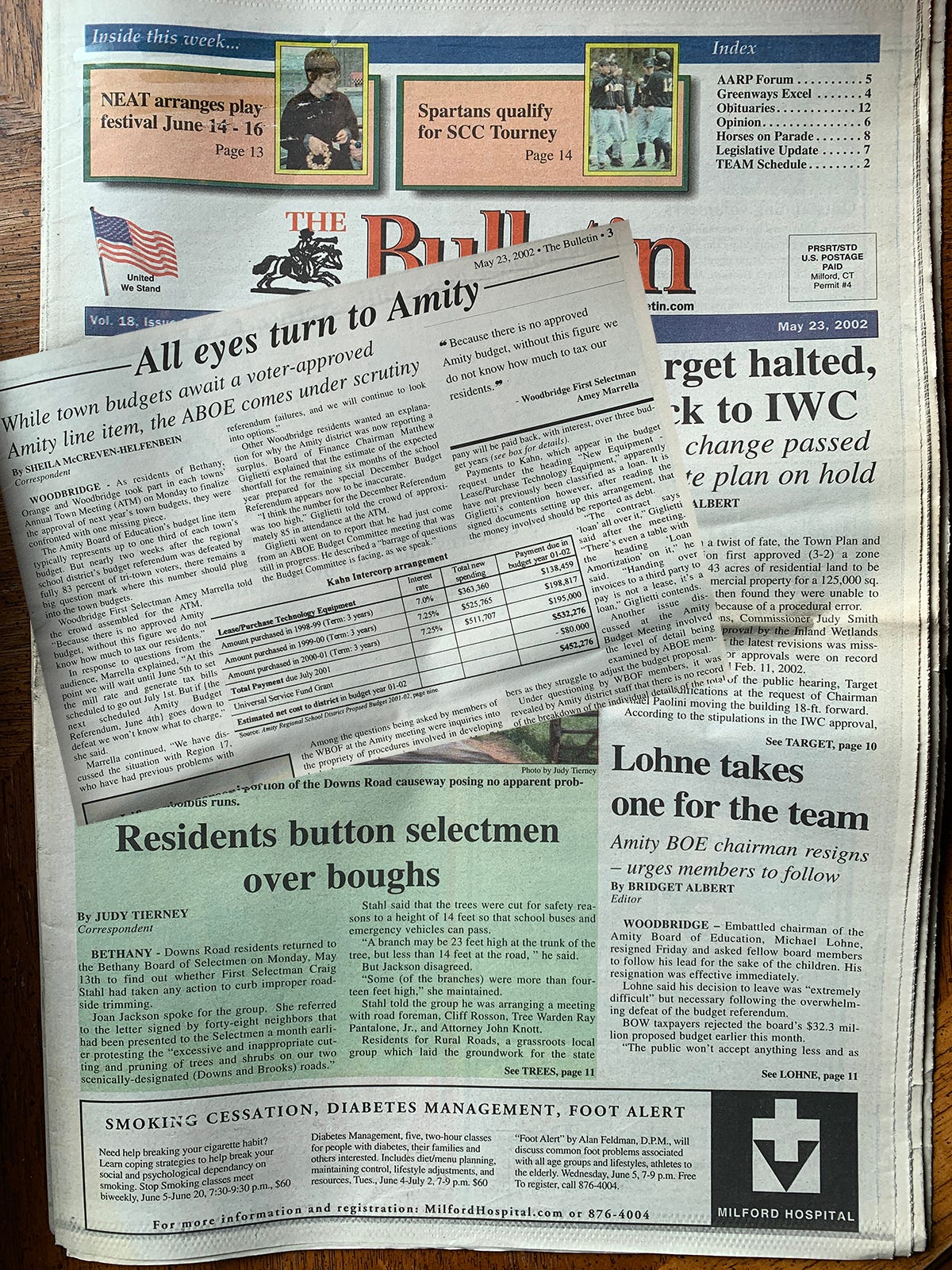
As residents of Bethany, Orange and Woodbridge took part in each towns' Annual Town Meeting on Monday to finalize the approval of next year's town budgets, they were confronted with one missing piece.
The Amity Board of Education's budget line item typically represents up to one third of each town's budget. But nearly two weeks after the regional school district's budget referendum was defeated by fully 83 percent of tri-town voters, there remains a big blank space where this number should plug into the town budgets.
Woodbridge First Selectman Amey Marrella told the crowd assembled for the ATM, "Because there is no approved Amity budget, without this figure we do not know how much to tax our residents."
In response to questions from the audience, Marrella explained, "At this point we will wait until June 5th to set the mill rate and generate tax bills scheduled to go out July 1st. But if {the next scheduled Amity Budget Referendum, June 4th} goes down to defeat we won't know what to charge," she said.
Marrella continued, "We have discussed the situation with Region 17, who have had previous problems with referendum failures, and we will continue to look into options."
Other Woodbridge residents wanted an explanation for why the Amity district was now reporting a surplus. Board of Finance Chairman Matthew Giglietti explained that the estimate of the expected shortfall for the remaining six months of the school year prepared for the special December Budget Referendum appears now to be inaccurate.
"I think the number for the December Referendum was too high," Giglietti told the crowd of approximately 85 in attendance at the ATM.
Giglietti went on to report that he had just come from an ABOE Budget Committee meeting that was still in progress. He described a "barrage of questions the Budget Committee is facing, as we speak."
Among the questions being asked by members of the WBOF at the Amity meeting were inquiries into the propriety of procedures involved in developing the budget proposal presented to voters on May 7th. WBOF members were seeking clarification on these matters before the ABOE considered any revisions of the proposal they plan to put before voters on June 4th.
Before Giglietti left the Amity meeting to join the Woodbridge ATM, he told ABOE members he thought it was possible that they may not legally be able to hold a budget referendum, "due to upwards of 150 violations of state statute you may be involved in," he said.
Giglietti continued, "Section 1060 clearly stipulates that a Regional district can not hold more than $500,000 in debt at any given time. However, the district currently owes Irving Kahn more than $1.5 million."
Giglietti is referring here to the district's contract with Kahn Intercorp. As reported in the Bulletin last October, Irving I. Kahn of the Farmington-based Kahn Intercorp has been making payments to Amity vendors each year under an agreement that his company will be paid back, with interest, over three budget years (see box for details).
Payments to Kahn, which appear in the budget request under the heading "New Equipment - Lease/Purchase Technology Equipment," apparently have not previously been classified as a loan. It is Giglietti's contention however, after reading the signed documents setting up this arrangement, that the money involved should be reported as debt.
"The contract says 'loan' all over it," Giglietti said after the meeting. "There's even a table with the heading 'Loan Amortization' on it," he said. "Handing over invoices to a third party to pay is not a lease, it's a loan," Giglietti contends.
Another issue discussed at the Amity Budget Meeting involved the level of detail being examined by ABOE members as they struggle to adjust the budget proposal.
Under questioning by WBOF members, it was revealed by Amity district staff that there is no record of the breakdown of the individual details of the total amounts requested by each department during the budget process last year.
It was suggested by WBOF member Leonard Bell that these backup documents would have been important to consult when making changes to budget line items in subsequent years, in order to substantiate what the changes would mean in specific terms. "Without backup, it's hard to tell where your budget is heading," he said.
At approximately 8:30 PM the Budget Committee voted to move into executive session to discuss a legal matter.
The full-ABOE plans to meet again Thursday evening to determine a revised budget proposal in time to give the legally required one week notice prior to its next budget referendum. That referendum has been set for Tuesday, June 4th.
~~~~~~~
Bridget Albert contributed to this article.
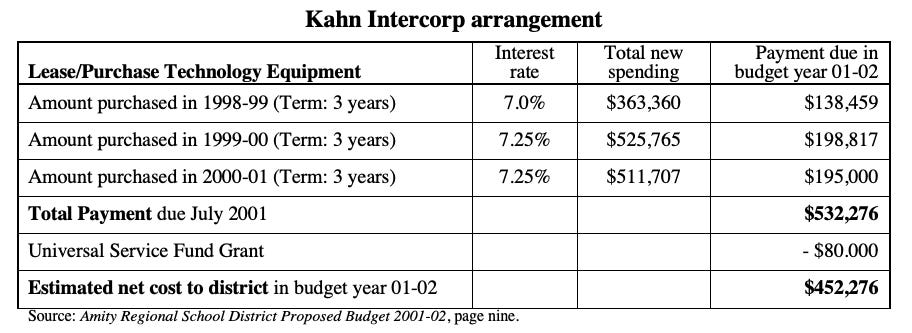
Amity budget is revised
By Sheila McCreven-Helfenbein, Corespondent
Published in the May 30, 2002 edition of The Bulletin
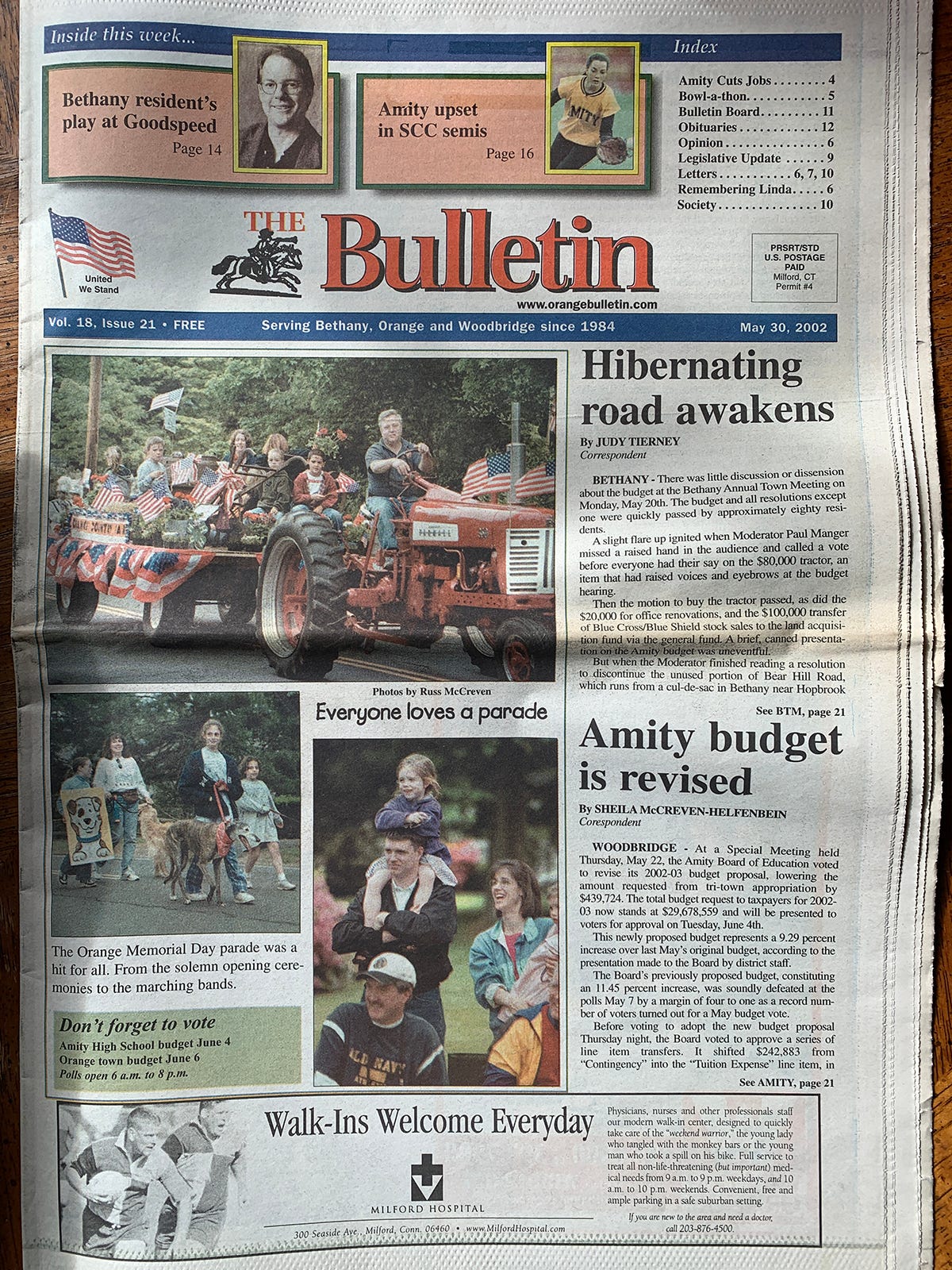
At a Special Meeting held Thursday, May 22nd, the Amity Board of Education voted to revise its 2002-03 budget proposal, lowering the amount requested from tri-town appropriation by $439,724. The total budget request to taxpayers for 2002-03 now stands at $29,678,559 and will be presented to voters for approval on Tuesday, June 4th.
This newly proposed budget represents a 9.29 percent increase over last May's original budget, according to the presentation made to the Board by district staff.
The Board's previously proposed budget, constituting an 11.45 percent increase, was soundly defeated at the polls May 7th by a margin of four to one as a record number of voters turned out for a May budget vote.
Before voting to adopt the new budget proposal Thursday night, the Board voted to approve a series of line item transfers. It shifted $242,883 from "Contingency" into the "Tuition Expense" line item, in anticipation of new Special Services needs.
It also voted to move $555,861 from "Equipment - New" and $314,471 from "Repairs, Maintenance and Cleaning" to the line item entitled "Other Professional and Technical Services" which covers legal fee expenditures.
These sums apparently constitute the payments due on the district's contracts with Kahn Intercorp (for technology equipment) and ServiceMaster (for janitorial services). It was noted at the time of the vote by Budget Committee Chair Ken Downey that the Board requires legal counsel to look into questions surrounding these two contracts.
The vote to send funds for these two expenditures into the legal services budget heading effectively moves discussion of these questions into executive session, as consultation on legal matters falls under attorney client privilege.